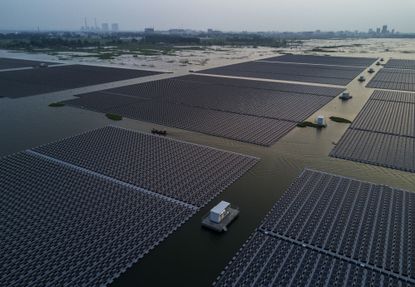In praise of Trump's solar panel tariffs
Environmentalists and businesspeople are ripping the president's plan. Not so fast ...


Making good on his "America first" rhetoric, President Trump slapped new tariffs on solar panel imports this week. Reaction from both environmentalists and the business world was swift and largely negative. The new policy won't generate many U.S. jobs, critics said. It will set back the growth of solar energy in America, and it could spark a trade war with China.
I'm not so sure. In fact, Trump's tariff may well be a good thing.
The administration will impose a four-year tariff schedule on all solar panels bought from abroad — 30 percent the first year, and then dropping by 5 percentage points each subsequent year, until it gets to 15 percent in the final year.
Subscribe to The Week
Escape your echo chamber. Get the facts behind the news, plus analysis from multiple perspectives.

Sign up for The Week's Free Newsletters
From our morning news briefing to a weekly Good News Newsletter, get the best of The Week delivered directly to your inbox.
From our morning news briefing to a weekly Good News Newsletter, get the best of The Week delivered directly to your inbox.
These tariffs are clearly aimed at China. A mere ten years ago, China was not a major player in the global solar manufacturing industry. But today, it accounts for around two-thirds of all solar panel production. American solar manufacturers argue that China achieved this dominance by unfairly subsidizing its own solar production, and then flooding the global market with ultra-cheap panels.
But that doesn't tell the whole story. Back in 2011, nearly three-fifths of all U.S. solar panel imports came from China. Today, it's 11 percent, with Malaysia and South Korea taking the top two spots at 31 percent and 21 percent, respectively. (It's worth pointing out that a lot of those imports could still be Chinese-owned companies stationed in Malaysia or South Korea, or Chinese-driven supply chains that stop off in those countries before ending as imports to America.)
American solar manufacturers have been hurt by such imports from abroad. More than a dozen have closed factories in the last six years. Ultimately, that's because solar panels from abroad are cheaper. America imports around 80 percent of its solar panels.
But critically, domestic manufacturing of solar panels is a minor part of the overall domestic solar industry. Of the 260,000 to 374,000 Americans who work in solar, only around 38,000 actually produce solar panels. The rest mainly work in installation and related services.
If your business is installing solar panels, you want those panels to be as cheap as possible. More expensive panels mean fewer customers. So while Trump's tariffs could create more jobs for solar manufacturing, it could potentially kill jobs in the far larger arena of solar installation.
Seems open and shut, right?
Well, maybe not. Because the effect of Trump's tariffs on the total price tag for domestic solar installations is likely to be minor. Estimates suggest the cost will rise at most by 10 percent, and probably far less for smaller-scale residential installations. That increase will push the cost of solar installations back up to where they were a mere year and a half ago. "I don't believe this decision will reverse the solar expansion in the U.S.," Fatih Birol, the executive director of the International Energy Agency, said at the World Economic Forum in Davos. "The global solar industry will adjust. The penetration of solar in the U.S. will continue."
Furthermore, solar panels from abroad are cheap because the countries that produce them often have low living standards. Their workers aren't paid much. That means those manufacturers don't really have to come up with new innovations and technological breakthroughs. They can compete mostly on price. American manufacturers, by contrast, have to pay their workers a lot more — and thus have a lot more incentive to innovate. American-made solar panels won't be the cheapest. But they might be the best.
However, American solar manufacturers will never really have the opportunity to innovate and be the best if they get run out of business by a flood of cheap competition from overseas. Giving U.S. solar manufacturers a few years of breathing space, as Trump's tariffs do, could really aid American solar innovation.
None of this is to say the tariffs are an ideal solution. Both sides in this debate are suffering from some pretty serious failures of imagination. Environmentalists are right to want as much solar as fast as possible, but are relying on breezy free trade "comparative advantage" arguments to push for it. Meanwhile, the Trump administration is right to worry about over-reliance on imports, but is falling back on brute mercantilism. You could envision an alternative where the U.S. government borrowed $1 trillion to invest in solar installations across the country, and promised to buy American while doing so. That would solve both sides' problems at once.
But within the unfortunate limits imposed by both sides' failures of imagination, Trump has arguably stumbled on a measured response to a complex and difficult problem. These tariffs are a good thing.
Sign up for Today's Best Articles in your inbox
A free daily email with the biggest news stories of the day – and the best features from TheWeek.com
Jeff Spross was the economics and business correspondent at TheWeek.com. He was previously a reporter at ThinkProgress.
-
 Cautious optimism surrounds plans for the world's first nuclear fusion power plant
Cautious optimism surrounds plans for the world's first nuclear fusion power plantTalking Point Some in the industry feel that the plant will face many challenges
By Justin Klawans, The Week US Published
-
 Explore new worlds this winter at these 6 enlightening museum exhibitions
Explore new worlds this winter at these 6 enlightening museum exhibitionsThe Week Recommends Discover the estrados of Spain and the connection between art and chess in various African countries
By Catherine Garcia, The Week US Published
-
 2024: the year of Black country artists
2024: the year of Black country artistsIn the Spotlight Beyoncé debuted 'Cowboy Carter' at the top of the country charts, shining a spotlight on artists like Shaboozey
By Theara Coleman, The Week US Published
-
 US election: who the billionaires are backing
US election: who the billionaires are backingThe Explainer More have endorsed Kamala Harris than Donald Trump, but among the 'ultra-rich' the split is more even
By Harriet Marsden, The Week UK Published
-
 US election: where things stand with one week to go
US election: where things stand with one week to goThe Explainer Harris' lead in the polls has been narrowing in Trump's favour, but her campaign remains 'cautiously optimistic'
By Harriet Marsden, The Week UK Published
-
 Is Trump okay?
Is Trump okay?Today's Big Question Former president's mental fitness and alleged cognitive decline firmly back in the spotlight after 'bizarre' town hall event
By Harriet Marsden, The Week UK Published
-
 The life and times of Kamala Harris
The life and times of Kamala HarrisThe Explainer The vice-president is narrowly leading the race to become the next US president. How did she get to where she is now?
By The Week UK Published
-
 Will 'weirdly civil' VP debate move dial in US election?
Will 'weirdly civil' VP debate move dial in US election?Today's Big Question 'Diametrically opposed' candidates showed 'a lot of commonality' on some issues, but offered competing visions for America's future and democracy
By Harriet Marsden, The Week UK Published
-
 1 of 6 'Trump Train' drivers liable in Biden bus blockade
1 of 6 'Trump Train' drivers liable in Biden bus blockadeSpeed Read Only one of the accused was found liable in the case concerning the deliberate slowing of a 2020 Biden campaign bus
By Peter Weber, The Week US Published
-
 How could J.D. Vance impact the special relationship?
How could J.D. Vance impact the special relationship?Today's Big Question Trump's hawkish pick for VP said UK is the first 'truly Islamist country' with a nuclear weapon
By Harriet Marsden, The Week UK Published
-
 Biden, Trump urge calm after assassination attempt
Biden, Trump urge calm after assassination attemptSpeed Reads A 20-year-old gunman grazed Trump's ear and fatally shot a rally attendee on Saturday
By Peter Weber, The Week US Published